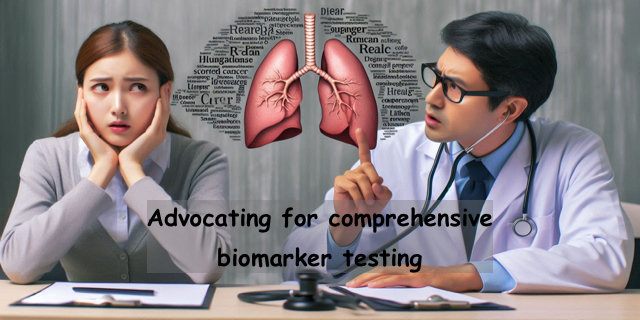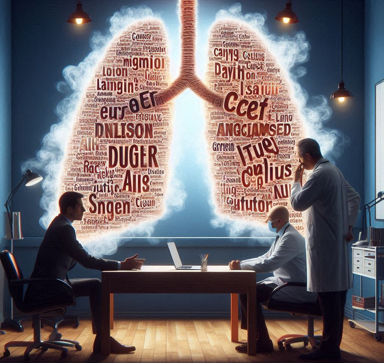You’ve just had an x-ray and are discussing the results with your doctor. The air in the office fills with complicated words after you hear “lung cancer” from your physician. You don’t hear anything else.
Not hearing or understanding anything else is part of the shock and a normal reaction.
But when you can think or when you have someone who can take notes and support you, there are three words that are very important for you to hear, listen for, and advocate about, before a surgeon performs a biopsy of your lung cancer. The phrase, comprehensive biomarker testing, may be unfamiliar to you. But it is imperative that you discuss it effectively with your surgeon or oncologist. Comprehensive biomarker testing actually has several names: comprehensive genetic testing, genomic testing, molecular testing, and tumor testing. And, in the past few years, this term and this type of testing has become crucial to the treatment you receive.
Comprehensive biomarker testing and targeted therapy
Comprehensive biomarker testing determines if you will receive targeted therapy (also called precision medicine or immunotherapy). It is critical to understand and to know how to ask for this type of testing if you have been diagnosed with non-small cell lung cancer (NSCLC). Importantly, no matter the stage of your lung cancer, you need to be able to ask about it before a biopsy, because the amount of tissue that your surgeon takes out in the biopsy affects getting results from this type of testing and actually getting comprehensive testing.
A recent webinar sponsored by OncLive called, Optimizing Treatment Outcomes in Advanced NSCLC with Concurrent Biomarker Testing, discussed the significance of biomarker testings. Dr. Zofia Piotrowska of Massachusetts General Hospital and Harvard University, along with Dr. Martin Dietrich of the US Oncology Network, Orlando, Florida, talked through the serious fact that patients are still not getting the biomarker testing they need. Dr. Dietrich stated, “Even though we know this [biomarker testing] is an integral part of therapy, we are still falling short. In retrospective studies over the last two years…we are only capturing two-thirds of patients and that data set is really consistent across the different databases that we are looking at.” [1] In other words, 33 percent of patients who should have their lung cancer tested for biomarkers are not getting this done.
What is biomarker testing?
Cancer is a genetic disease and biomarker testing looks at the genes that are in cancer cells. . Cancer cells grow quickly and irregularly because of changes in their genes. Research has found that certain changes in genes drive cancer cells’ strange, out-of-control growth. These changes, called driver mutations, can be targeted with new treatments which stop the actions of those genes. The driver mutations that have been identified are called biomarkers.
According to Dr. Piotrowska (as of June 18, 2024), “We are up to 9 biomarkers with approved targeted therapies.” The alphabet soup of biomarkers are EGFR, ALK, ROS1, BRAF, NTRK, RET, MET, KRAS, and HER2.[1]
Yet, even though biomarker testing has been the recommended since 2011 [2] as the standard of care for metastatic or advanced NSCLC patients, a 2022 study found that nearly half of these patients had not had biomarker testing. And, of those who did get the testing, one third counld not access the appropriate targeted treatment.[3] Not good statistics…
The study documented some of the reasons for these poor results. They include 1) not getting the testing results in a timely fashion, 2) not putting the results into the electronic medical record so that treatment could begin, 3) problems with interpreting the tests appropriately and, 4) patients not being about to access the drugs. Other problems that have arisen in conducting biomarker testing include: 5) too little tissue obtained during the biopsy to perform the biomarker tests, 6) problems with the process of ordering—does the pathologist order the test or does the oncologist order the test?- and 7) turn around time to get the testing back. [3]
Many of these reasons for not obtaining appropriate biomarker testing are preventable, but they require advocacy on the patient’s and/or caregiver’s part.
For example, first, patients and caregivers need to advocate for comprehensive biomarker testing. Drs. Piotrowska and Dietrich do not recommend single biomarker testing because it wastes the precious biopsied tissue. Second, these biomarker tests should be requested for all patients, from stage 1 NSCLC through stage 4 NSCLC. In fact, Drs. Piotrowska and Dietrich endorse this recommendation along with (concurrently) liquid biopsy testing. [1]
Liquid biopsies test blood from the patient. In the blood, it is possible to detect DNA and RNA that has sloughed off the cancer which can provide further information about the cancer. Although Dr. Piotrowska noted that liquid biopsy has limitations — not all patients shed enough DNA and RNA to be able to clearly define the best targeted treatment — she still uses it concurrently for supplemental information. However, she waits for the comprehensive biomarker test results to return before starting treatment. [1]
Lung cancer can happen to anyone
Non-smokers as well as smokers can get lung cancer. In fact, radon is the leading cause of lung cancer in non-smokers. Created naturally as uranium decays, high radon levels have been found in every state.
Air pollution has also been implicated in getting lung cancer. In fact particulate matter 2.5 (PM2.5), is known to be a problem. PM2.5 particles or droplets in the air are tiny, only two and one half microns or less in width (so small they can only be seen by a microscope). Yet these particles flow right into the lungs and they affect lung function. A presentation at European Society of Medical Oncology (ESMO) in 2022, researchers validated that increasing PM2.5 concentrations were significantly associated with one specific kind of NSCLC with mutations in the EGFR gene.
Why should I know about comprehensive biomarker testing?
Finally, cancer may not happen to you but it may happen to a friend or loved one. All caregivers need knowledge about comprehensive biomarker testing to share with anyone dealing with cancer.
REFERENCES
1)Piotrowska, Z and Dietrich, M. (2024, June 18). Key takeaways for concurrent biomarker testing.: Episode 9. Onc Live. [webinar]. https://www.onclive.com/view/key-takeaways-for-concurrent-biomarker-testing-in-nsclc
2. Pennell, N. et. al. (2019). Biomarker testing for patients with advanced non-small cell lung cancer: Real-world issues and tough choices. American society o Clinical Oncology Educational Book (Vol 39). https://doi.org/10.1200/EDBK_237863
3) Sadik H, Pritchard D, Keeling DM, Policht F, Riccelli P, Stone G, Finkel K, Schreier J, Munksted S. Impact of Clinical Practice Gaps on the Implementation of Personalized Medicine in Advanced Non-Small-Cell Lung Cancer. JCO Precis Oncol. 2022 Oct;6:e2200246. doi: 10.1200/PO.22.00246. PMID: 36315914; PMCID: PMC9666118.







